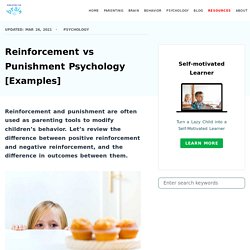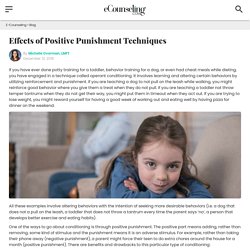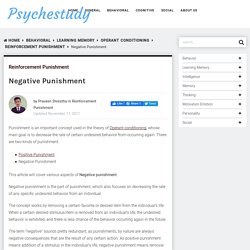

Therefore, what is the right and best technique to tackle these teenagers? Operant Conditioning. Operant Conditioning Summary. Reinforcement VS Punishment Psychology. Reinforcement and punishment are often used as parenting tools to modify children’s behavior.

Let’s review the difference between positive reinforcement and negative reinforcement, and the difference in outcomes between them. The Difference Between Positive And Negative Reinforcement In behavioral psychology, reinforcement is the introduction of a favorable condition that will make the desired behavior more likely to happen, continue or strengthen in the future1. Because the favorable condition acts as a reward, reinforcement is a reward-based operant conditioning. Video. Examples of using Reinforcement and Punishment at Home.
Summary of Reinforcement. Summary of Punishment. Positive Reinforcement - Tips for teaching and parenting. What is Negative Reinforcement? Effects of Positive Punishment Techniques. If you have ever done potty training for a toddler, behavior training for a dog, or even had cheat meals while dieting, you have engaged in a technique called operant conditioning.

It involves learning and altering certain behaviors by utilizing reinforcement and punishment. If you are teaching a dog to not pull on the leash while walking, you might reinforce good behavior where you give them a treat when they do not pull. If you are teaching a toddler not throw temper tantrums when they do not get their way, you might put them in timeout when they act out. If you are trying to lose weight, you might reward yourself for having a good week of working out and eating well by having pizza for dinner on the weekend.
All these examples involve altering behaviors with the intention of seeking more desirable behaviors (i.e. a dog that does not a pull on the leash, a toddler that does not throw a tantrum every time the parent says ‘no’, a person that develops better exercise and eating habits). Negative Punishment - Psychestudy. Punishment is an important concept used in the theory of Operant conditioning, whose main goal is to decrease the rate of certain undesired behavior from occurring again.

There are two kinds of punishment This article will cover various aspects of Negative punishment. Negative punishment is the part of punishment, which also focuses on decreasing the rate of any specific undesired behavior from an individual. The concept works by removing a certain favorite or desired item from the individual’s life. When a certain desired stimulus/item is removed from an individual’s life, the undesired behavior is exhibited, and there is less chance of the behavior occurring again in the future. Summary. Parenting Teens: When It Comes To Learning, Positive Reinforcement Trumps Punishment.
Teens generally aren’t afraid to defy authority.

Generations of parents know this, having tried different strategies for getting their adolescents to do what they ask — often in attempts to keep them safe and help pave a path toward success. Now, a new study shows that rewards, rather than punishments, could be the way to get them to cooperate. Rewarding behavior is key to parenting teens, study suggests. Parenting is hard, and parenting teens brings about an entirely new set of challenges, from keeping their rooms clean to getting them home before curfew.

But, a new study suggests parents who want their teenagers to keep their grades up could have better success if they focus more on rewarding good behavior and less on threatening to punish the bad. According to the report, published in PLOS Computational Biology, British researchers have found that adolescents focus well on positive incentives, but have difficulty staying motivated to avoid penalties. The study shows that teens and adults learn in different ways, according to the study’s lead author Stefano Palminteri, a researcher with the Institute of Cognitive Neuroscience at University College London. Does it work?